| Srl | Item |
| 1 |
ID:
083055
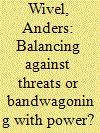

|
|
|
|
|
| Publication |
2008.
|
| Summary/Abstract |
The United States has played an important role in European security since the early 20th century. From the time of the end of the Cold War, this role has changed as a consequence of the lack of a common territorial threat and the overwhelming power of the United States relative to Europe. How have European states responded to the challenges of the American world order? Are they adapting their security policies to match the challenges of US security policy and the American world order? What are the implications of the European response for the transatlantic relationship? This article seeks to describe and explain European security behaviour in the American world through the prism of two realist theories: balance of power realism and balance of threat realism. Despite sharing a common starting point in realist assumptions, each theory allows us to tell a different story about Europe's position in the American world order as well as the opportunities and challenges it faces
|
|
|
|
|
|
|
|
|
|
|
|
|
|
|
|
| 2 |
ID:
066193


|
|
|
| 3 |
ID:
180830
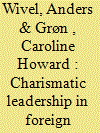

|
|
|
|
|
| Summary/Abstract |
Charismatic leadership is an integral yet understudied aspect of foreign policy in liberal democratic states. Combining insights from recent developments on charismatic leadership in organization and management studies with literature on foreign policy, we construct a novel theoretical framework for understanding how foreign policy leaders exercise charismatic leadership. We argue that charismatic leadership makes sense of who ‘we’ are and where we are going through communicative practices. We specify these practices and discuss why charismatic leadership is important in foreign policy analysis; what it is; and how and why sense-making matters for a charismatic leadership style. We contribute with new empirical knowledge by probing our theoretical propositions in a comparative case-study of the charismatic leadership practices of Donald Trump and Angela Merkel. The case-studies illustrate the importance of charismatic communication for both leaders, while disclosing variations in both the ‘thickness’ of charismatic leadership practices and their compatibility with rational legal authority and liberal democratic values.
|
|
|
|
|
|
|
|
|
|
|
|
|
|
|
|
| 4 |
ID:
065052
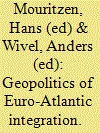

|
|
|
|
|
| Publication |
London, Routledge, 2005.
|
| Description |
xiii, 269p.
|
| Series |
Europe and the nation state
|
| Standard Number |
0415282802
|
|
|
|
|
|
|
|
|
|
|
|
Copies: C:1/I:0,R:0,Q:0
Circulation
| Accession# | Call# | Current Location | Status | Policy | Location |
| 049974 | 341.2422/MOU 049974 | Main | On Shelf | General | |
|
|
|
|
| 5 |
ID:
160064
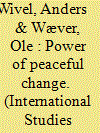

|
|
|
|
|
| Summary/Abstract |
The European Union is typically perceived by its proponents as an avant-garde, anti–power politics polity capable of civilizing its own political space and its geopolitical neighborhood (see Manners 2002; Kaldor et al. 2016). For the past decade, this conventional European narrative has been challenged by a series of events and developments amounting to an allegedly existential crisis of the EU. We unpack the nature of the current crisis and identify three long-term developments within the EU. In order to understand the crisis and its potential consequences for peaceful change in Europe, we use two analytical prisms to explore how and why the EU is, at the same time, a successful example of international peaceful change—even peaceful transformation—in international affairs and plagued by existential crisis. The first prism is realist and explains European integration and its development in terms of the interests of the most powerful states. The second prism is identity constructivist and explains European integration in terms of identity articulations. We do not seek to subsume one of these positions to the other in a theoretical synthesis, nor do we aim for analytical eclecticism—letting each theory do what it is supposed to do best (e.g., leaving the explanation of peaceful change to the constructivists and the explanation of crisis to the realists).
|
|
|
|
|
|
|
|
|
|
|
|
|
|
|
|
| 6 |
ID:
098882
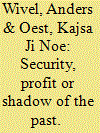

|
|
|
|
|
| Publication |
2010.
|
| Summary/Abstract |
Which factors determine the security strategies of microstates? Many microstates are either secluded island states or have very close political, economic and cultural ties to a larger neighbouring 'protector state'. They have had, therefore, little use for more traditional alliance arrangements. However, the patterns of security cooperation between states have shifted as the significance of flexible ad-hoc coalition-building as a means to coordinate international interventions has increased. Consequently, the strategic security challenges and opportunities for microstates have been transformed. Focusing on the Operation Iraqi Freedom coalition, this article explores some of these challenges and opportunities. Three hypotheses regarding the decisions made by the respective microstates to join international ad-hoc coalitions are studied: (1) participation provides increased security, (2) participation provides economic gains, and (3) participation reflects the lessons of past security challenges. The explanatory powers of each hypothesis are examined using a comparative case study of 11 Pacific microstates.
|
|
|
|
|
|
|
|
|
|
|
|
|
|
|
|
| 7 |
ID:
075684
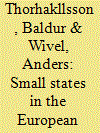

|
|
|
| 8 |
ID:
151391
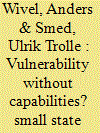

|
|
|
|
|
| Summary/Abstract |
Today, small European states regularly need to go out of area and out of tried and tested institutional settings to defend their security interests. How do small European states meet this challenge most effectively? This analysis suggests that small states can influence multilateral decisions on international security by combining norm entrepreneurship with lobbying and taking on the role as an “honest broker”. However, economic capacity, an effective state administration, and interests compatible with the agendas of the great powers are key to success. Based on a comprehensive empirical material including 19 elite interviews as well as official documents and other written material, we process trace how one small European state, Denmark, influenced the development of international counter-piracy cooperation and the development of an international counter-piracy strategy for the Gulf of Aden and off the Horn of Africa and discuss which lessons the Danish case may hold for other small states.
|
|
|
|
|
|
|
|
|
|
|
|
|
|
|
|